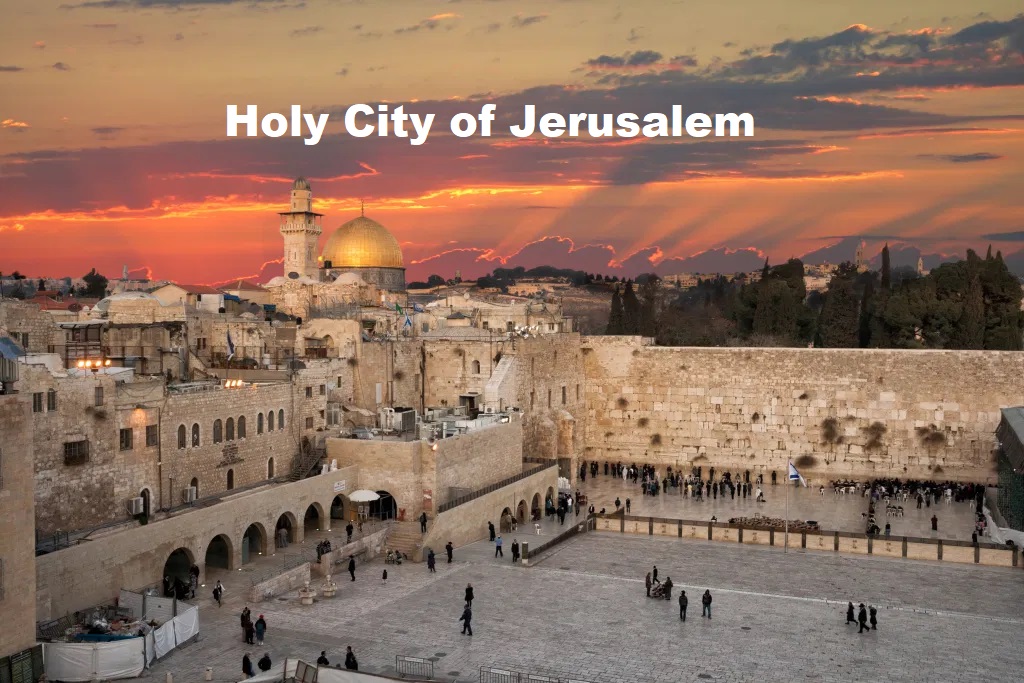Jerusalem, the City of David Ever Augmenting into a Greater Religious Site
Prepare the way in Holiness for the Lord is coming. Revelation 22:7
Jul 30, 2025 11 Min Read

Jerusalem, once called Jebus, an obscure stronghold tucked between the hills. It was not always the city that stirred the heart of nations and bore the weight of prophecy. Before David captured it, it was scarcely known, almost swallowed by the spiritual obscurity of the Canaanite world. But over time, it would rise; not merely in physical size, from a humble 0.4 square miles to a modern 49; but in meaning. It would be stitched into the fabric of eternity.
This reflection journeys through that transformation: from a pagan outpost to the eternal dwelling of the Righteous: the city of God, the city of the Great King.
When Holy Ground Is Chosen
The first sacred sites in Scripture were not made with brick or mortar. They emerged where the Divine intersected human experience. When Samuel set up a stone and called it Ebenezer saying, “Thus far the LORD has helped us” (1 Samuel 7:12). He was naming a place where heaven touched earth through a miraculous divine victory over Philistines.
These moments dotted Israel’s history, like echoes of a deeper, coming reality. And perhaps the earliest foreshadowing of Jerusalem happened not with David, but with Abraham, father of nations and a friend of God.
Did Abraham Encounter Jerusalem?
Abraham did, but not by name.
“Take your son, your only son Isaac, whom you love, and go to the region of Moriah. Sacrifice him there as a burnt offering on a mountain I will show you.” — Genesis 22:2
The very very site where Abraham lifted his knife to surrender Isaac became known later as the Temple Mount. And behold the Lamb of God appeared to save Isaac. The chronicler makes it plain:
“Then Solomon began to build the temple of the LORD in Jerusalem on Mount Moriah, where the LORD had appeared to his father David. It was on the threshing floor of Araunah the Jebusite…” — 2 Chronicles 3:1
But Abraham’s encounters with the city run deeper still. In Genesis 14, he meets Melchizedek, king of Salem, a place many identify with ancient Jerusalem, as confirmed in Psalm 76:2:
“His tabernacle is in Salem; His dwelling place also is in Zion.”
Melchizedek, this priest-king without genealogy or end blessed Abraham and received tithes from him, an act that revealed an unseen spiritual hierarchy. No other man in Scripture bears such a role again until David, inspired by the Spirit, writes:
“The LORD has sworn and will not change his mind: ‘You are a priest forever, in the order of Melchizedek.’” — Psalm 110:4
Was he Jesus epiphany?
Thus Jerusalem is first met as Salem, then Moriah, then Zion: each a thread weaving into a city chosen by God.
The Capture of Jerusalem
The LORD God gave Canaan to the Israelites under the leadership of Joshua. One of the triumphal entries that ever existed in the Bible. When Joshua led the conquest of Canaan, God’s power was manifest, walls fell by trumpets, cities surrendered to the shout of faith. But Jerusalem remained untouched.
“Judah could not dislodge the Jebusites, who were living in Jerusalem; to this day the Jebusites live there with the people of Judah.” — Joshua 15:63
Jerusalem, fortified and defiant, stood apart until David came. As recorded in 2 Samuel 5, David, a man after God's own heart, stormed the city and took the stronghold of Zion, renaming it the City of David. Unbeknownst to many, The LORD God most high had chosen the city. It was city of God's dwelling place; The Jebusites had mocked him, they probably believed their gods were more powerful than Yahweh:
“You will not get in here; even the blind and the lame can ward you off.” — 2 Samuel 5:6
But David, known for his subtle digs as was with Goliath, did get in. And he responded with a cutting reply:
“Whoever attacks the Jebusites must go up the water shaft to reach those 'lame and blind' who are David’s enemies.” (v. 8)
That is why they say, “The blind and the lame will not enter the palace.”
It became a proverb, but beneath it lay prophecy. David had claimed a city God had long been preparing. As Moses once prophesied:
“But you are to seek the place the LORD your God will choose from among all your tribes to put his Name there for his dwelling.” — Deuteronomy 12:5
That place in Deuteronomy God instructed Moses was Jerusalem.
“For the LORD has chosen Zion, he has desired it for his dwelling, saying: ‘This is my resting place for ever and ever; here I will sit enthroned, for I have desired it.’” — Psalm 132:13–14
“The LORD of Hosts, who dwells on Mount Zion…” — Isaiah 8:18
No More Blindness, No More Lameness
David ruled from Jerusalem for 33 years. The city that had once mocked him would become the hub of prophecy, the seat of worship, the place where heaven opened its gates.
The phrase “the blind and the lame will not enter” would be turned on its head in the kingdom of the Son of David.
“Then will the eyes of the blind be opened and the ears of the deaf unstopped. Then will the lame leap like a deer…” — Isaiah 35:5–6
“The blind and the lame came to him at the temple, and he healed them.” — Matthew 21:14
Jerusalem became the fulfillment of Bethel, the dream of Jacob now incarnate in stone and Spirit.
The Triumphal Entry: Jerusalem Baptized in Glory
By the time Jesus appeared in history, Jerusalem was world-renowned. But He came not with armies, nor chariots, but on a donkey, fulfilling ancient words of YHWH that gives goosebumps on reading:
“Rejoice greatly, Daughter Zion! Shout, Daughter Jerusalem! See, your king comes to you, righteous and victorious, lowly and riding on a donkey.” — Zechariah 9:9
This entry was more than symbolic, it was prophetica and poetic. He was entering the very city where God had once descended in cloud and fire at Solomon’s Temple:
“And when the priests came out of the Holy Place, the cloud filled the house of the LORD… for the glory of the LORD had filled the house of the LORD.” — 1 Kings 8:10–11
That glory had departed in the days of Ezekiel (Ezekiel 10:18), but the return had been promised:
“The glory of this present house will be greater than the glory of the former house, says the LORD Almighty.” — Haggai 2:9
Jesus' arrival was the glory returning not to a building, but in flesh. The LORD God Almight YHWH, the SON and second in the Trinity. When the time to return to heaven came, there could not have been any other city, Mount of Olives it was and so will He return from there as Zechariah 14 saw.
Jerusalem as the Eschatological Center
Jerusalem, the holiest city was also the biggest killer of prophets or innocent blood. Jesus wept over it in Luke 19:41. He knew it would reject Him, and for that, suffer. But the rejection would not be final.
“Jerusalem, Jerusalem, you who kill the prophets and stone those sent to you… Look, your house is left to you desolate. For I tell you, you will not see me again until you say, ‘Blessed is he who comes in the name of the Lord.’” — Matthew 23:37–39
In the last days, Jerusalem is attacked, shaken, purified; but ultimately saved. God had plans to shake for the murders it caused but again he was a merciful and slow to anger Jehovah.
“On that day his feet will stand on the Mount of Olives, east of Jerusalem… and the LORD my God will come, and all the holy ones with him.” — Zechariah 14:4–5
Isaiah 53:1
Who has believed our message and to whom has the arm of the Lord been revealed?
Jerusalem strikes again. This time it regains hollines, comfort and everything it was meant to be. She becomes the mountain of instruction:
“In the last days, the mountain of the LORD’s temple will be established… and all nations will stream to it… The law will go out from Zion, the word of the LORD from Jerusalem.” — Isaiah 2:2–3
And Jacob, once a wanderer, finds rest again culminating the long suffering of God to find peace and rest for his holy people:
“So do not be afraid, Jacob my servant; do not be dismayed, Israel… I will surely save you… Jacob will again have peace and security, and no one will make him afraid.” — Jeremiah 30:10
The New Jerusalem
The Bible says, heaven and earth will pass but the word of the Lord will not. Jerusalems seems to have its name etched in eternity.
“Then I saw ‘a new heaven and a new earth,’ for the first heaven and the first earth had passed away… I saw the Holy City, the new Jerusalem, coming down out of heaven from God…” — Revelation 21:1–2
No sun, for the glory of God gives it light. No temple, for the Lord God Almighty and the Lamb are its temple. And no wickedness shall ever enter therefore, let us all repent to receive it:
“Nothing impure will ever enter it, nor will anyone who does what is shameful or deceitful, but only those whose names are written in the Lamb’s book of life.” — Revelation 21:27
Jerusalem is not finished. It grows from glory to glory.
First a city of conquest, then of kings.
A place of sacrifice, then of resurrection.
It was mocked. It will be worshipped.
It was defiled. It will be dazzling.
It was made of stone. It will be made of glory.
And of it, God says:
“This is my resting place forever; here I will dwell, for I have desired it.” — Psalm 132:14
Call to Action: Pray for the Peace of Jerusalem
It is no wonder, no mystery at all why YHWH commands His people not to forget this city, not to grow indifferent to her burdens, nor silent about her future. The Lord, who watches over Israel and neither slumbers nor sleeps, placed Jerusalem not only on a map, but on the hearts of those who love Him.
“Pray for the peace of Jerusalem: ‘May those who love you be secure. May there be peace within your walls and security within your citadels.’ For the sake of my family and friends, I will say, ‘Peace be within you.’” — Psalm 122:6–8
To pray for Jerusalem is to align your longing with God’s eternal plan for from this city came forth the law, the prophets, the Temple, the Messiah, and the blood that redeemed the world.
“For out of Zion shall go forth the law, and the word of the LORD from Jerusalem.” — Isaiah 2:3
It is not just a cultural relic or a religious landmark. It is the apple of God’s eye (Zechariah 2:8), a city carved into covenant. When Jerusalem is blessed, the people of God share in that blessing.
“I will bless those who bless you, and whoever curses you I will curse; and all peoples on earth will be blessed through you.” — Genesis 12:3
Though spoken first to Abraham, the promise reverberates through the gates of Jerusalem, for it was there God chose to place His Name, there the covenant would unfold, there that blessing would flow to the nations.
To curse Jerusalem, to mock it or neglect it, is to forget the womb that birthed redemption.
To bless her, to intercede for her peace, is to walk in step with the heart of God.
“Comfort, comfort my people, says your God. Speak tenderly to Jerusalem…” — Isaiah 40:1–2
“Rejoice with Jerusalem and be glad for her, all you who love her; rejoice greatly with her, all you who mourn over her.” — Isaiah 66:10
For those who weep over her brokenness now, there is the hope of eternal rejoicing.
For those who sow in tears for her peace, they will one day reap in joy.
So we pray not out of ritual, not out of tradition, but out of prophecy.
We pray because the story is not yet over.
And when we say, “Peace be upon Jerusalem”, we are not just longing for quiet…
We are longing for His return, JESUS' return.


